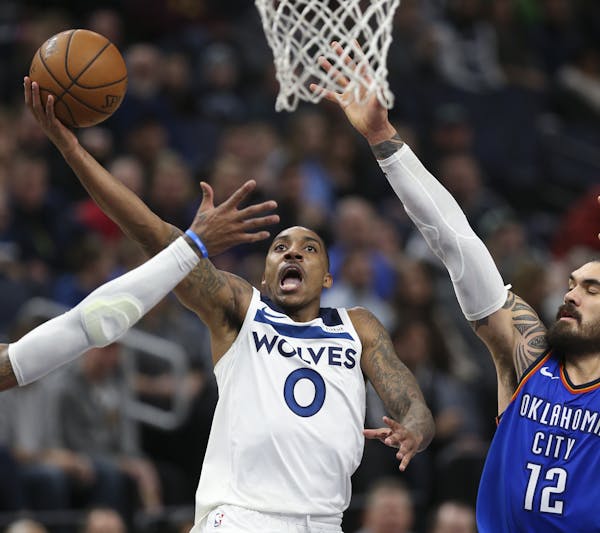It is a theory that not everyone was ready to embrace after practice Saturday.
Timberwolves coach Tom Thibodeau, immersed in the process, didn't want to talk about a watershed moment. Jimmy Butler, when asked if the Wolves' season had taken an important turn almost a month ago, chose idiom over endorsement.
"If 'if' was a fifth, we'd all be drunk, that's for sure," Butler said. "I can't tell you. I don't know."
But something happened. Almost exactly a month ago, in a home game vs. Phoenix, the Wolves led by 12 late in the third quarter only to lose. It was a difficult loss against a less-than-stellar team. It ended a 12-game stretch in which the Wolves had gone 7-5 before the Suns' Isaiah Canaan hit three free throws with six seconds left.
Since then?
The Wolves will finish up a five-game homestand Sunday against Portland looking for just their second 5-0 homestand ever. Minnesota has won 11 of its past 14 games, its past four games overall and its past seven at home.
And that streak started two days after that Phoenix loss against the same Blazers who will be here Sunday night.
Butler's back was aching, but he played, hefting the team onto that sore back to help the Wolves rally from 10 down with 7½ minutes left to win by a point with his two free throws with 2.5 seconds left.
That was the first of five straight victories, including a three-game road sweep at Denver, Phoenix and the Los Angeles Lakers.
In that 14-game stretch the Wolves have an offensive rating of 113.8, best in the league, a 103.7 defensive rating (sixth) and a plus-10.1 net rating (first).
If watershed isn't the word, what is?
"In the Portland game I think we just were at a moment, almost a moment of truth," Jamal Crawford said. "We were down in the fourth quarter. And we could have went one way. Coming off a tough loss, we could have splintered and went one way. But we found a way to win that game. And, from there, I think we just kind of steamrolled."
For a number of reasons.
In that rally vs. the Blazers, fans saw a glimmer of improved defensive play by young players Karl-Anthony Towns and Andrew Wiggins; it was Wiggins' play, late, stuffing Suns player Al-Farouq Aminu, that created a key turnover in the comeback.
Crawford, who had discussed his playing time just before the win, scored 23 points, 16 in the fourth quarter.
But, really, it was a case of a Wolves team almost always capable of scoring, starting to play — as a unit — with the same ferocity on the other end. It was something Butler spent the first weeks of the season harping on, and something that finally seems to have happened. Butler has mentored Wiggins; Taj Gibson has mentored Towns, who came one assist short of a triple double Friday and in particular has blossomed.
And much of it started after that difficult loss to the Suns.
"I think when you lose tough games, and you get humbled, you know that feeling of letdown," Gibson said. "Going home that night, knowing what you could have done better to help the team win? It sets in. It seems after that game guys kind of understood a little more. It won't always be perfect. But you see guys getting angry off when somebody scores on 'em. When we mess up assignments. That's what you want."
The Wolves' past 11 wins have come by an average of 13.2 points, their past eight by an average of 15.9. On this homestand, the four wins have come by an average of 18 points.
"What's encouraging to me is the way KAT is seeing the game right now," Thibodeau said. "Same with Wiggins. We've seen it from Jimmy all year. Taj is just terrific. You like everyone to be playing well."
Friday against New York eight players scored in double figures, including three off the bench. Eight players also had multiple assists. On a night when Butler was relatively quiet, another double-figure win, 118-108.
"It's a learning experience," Towns said. "We had to change if we wanted to beat teams night-in and night-out. We accepted that we had to sacrifice more, sacrifice for each other."

Minnetonka rolls past Anoka and into the Class 6A Prep Bowl

Wild's victory over Montreal comes at a cost: Injuries to Eriksson Ek and Zuccarello

Pepi goal lifts US over Jamaica 1-0 in CONCACAF Nations League quarterfinal first leg

